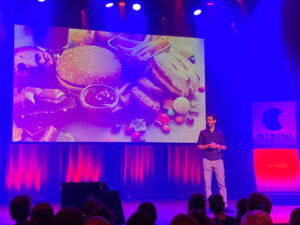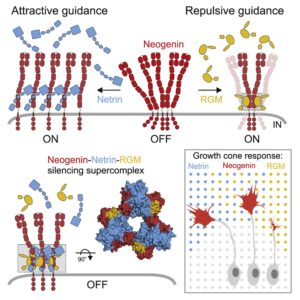Frank Meye explains why stress leads to bad eating patterns

Last Friday Tivoli-Vredenburg hosted the 5th edition of the Betweter festival, organized by Utrecht University, celebrating 385 years of science in Utrecht. Assistant professor Frank Meye was there, at Cloud Nine, a popular hall for concerts, explaining why we eat badly under stress. He discussed what drives our tendencies to eat fat and sugar after a long stressful day, and which processes in the brain are linked to this.
External links
See the official website
PhD course: Current Issues in Neurodevelopment
Aim:
The aim of this PhD course is to provide participants with a thorough understanding of the molecular and cellular basis of neural development and to discuss state-of-the-art techniques, in vitro and animal models that can be used to study the developing nervous system.
Organisation:
Organising institute: Brain Center, UMC Utrecht, UtrechtDates: 8-12 november 2021 Registration through: cen-secretariaat@umcutrecht.nl Duration of the course: 1,5 ECTs Maximum number of participants: 40 Accessible for: Brain Center PhD candidates (and ONWAR PhD students) Costs: free of charge
Contents:
This PhD course is divided into five days (8-12 november 2021) with both ‘online’ and ‘live’ sessions and covers various aspects that are imperative for studying neural development in health and disease. The focus will be on electrophysiological, omics and in vitro technical approaches. Each day there will be at least two lectures, which will be mixed with interactive assignments.
The preliminary list of speakers:
Prof. Takao Hensch (Harvard University, Neurology, Molecular & Cellular Biology)
Em. Prof. Peter Burbach (UMC Utrecht Brain Center, Translational Neuroscience)
Prof. Sten Linnarsson (Karolinksa, Molecular Neurobiology)
Dr. Nael Nadif Kasri (Radboud University, Donders Center for Medical Neurosciences)
Prof. Thomas Quatieri (MIT Lincoln Laboratory, Biotechnology and Human Systems)
Dr. Jeroen Dudink (UMC Utrecht Brain Center, Wilhelmina Childrens Hospital, Neonatology)
Dr. Corette Wierenga (Utrecht University, Cell Biology)
Prof. Manon Benders (UMC Utrecht Brain Center, Wilhelmina Childrens Hospital, Neonatology)
Prof. Jeroen Pasterkamp (UMC Utrecht Brain Center, Translational Neuroscience)
Vidi grant for Frank Meye
 Assistant professor Frank Meye researches how stress alters the strength of connections in the brain involved in decision-making, and how this can lead to impulsive eating behavior. He also investigates how this process can be turned for the better by targeted manipulation of brain activity.
Assistant professor Frank Meye researches how stress alters the strength of connections in the brain involved in decision-making, and how this can lead to impulsive eating behavior. He also investigates how this process can be turned for the better by targeted manipulation of brain activity.
He has received the prestigious VIDI grant (800,000 euro), titled “The need to eat: Why stress makes you crave junk food “, to facilitate his research at our Translational Neuroscience Department.
“This Vidi grant plays a crucial role in further forming my research group that aims to understand how stress leads to plastic changes in the brain, and how this plays a role in multiple disease processes. It’s great that this application has been granted, as our lab is very excited to take on the challenge of better understanding these important processes!” Frank Meye
External links:
https://www.umcutrecht.nl/en/about-us/news/details/seven-vidi-grants-awarded-to-umc-utrecht
https://www.nwo.nl/en/researchprogrammes/nwo-talent-programme/projects-vidi/vidi-2020
Life of a Principal Investigator. A Talk with Prof. Dr. Elly Hol
Are you dreaming about academic career? It is very useful to hear the experiences of daily professional life of a principal investigator from a person, who actually has undergone this pathway. Learn about a great example of outstanding academic career in the conversation of a GSLS student and Radio Life Sciences team member Zuzanne Altmann
Link: https://open.spotify.com/episode/1kF3LfPHEq0KJHUSKA1Id7?si=eb3c568a30bb4eab&nd=1
No need for competition
 During brain development signaling proteins guide traveling neurons and their axons. These proteins do so by binding the receptor on the cell membrane of the neuron. For a long time it was thought that when two different proteins are close to the receptor they compete for binding. However, we found that instead of competing for binding, two different proteins can both bind the receptor at the same time. When this binding occurs the receptor is turned off, meaning that the neuron turns insensitive to signals. Because we now better understand this mechanism we might be able to use this knowledge in the future to answer disease-related questions.
During brain development signaling proteins guide traveling neurons and their axons. These proteins do so by binding the receptor on the cell membrane of the neuron. For a long time it was thought that when two different proteins are close to the receptor they compete for binding. However, we found that instead of competing for binding, two different proteins can both bind the receptor at the same time. When this binding occurs the receptor is turned off, meaning that the neuron turns insensitive to signals. Because we now better understand this mechanism we might be able to use this knowledge in the future to answer disease-related questions.